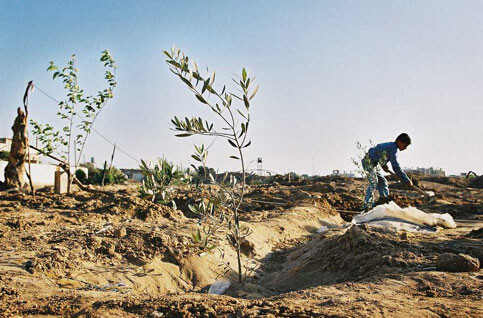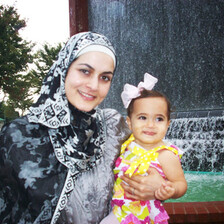The Electronic Intifada 21 January 2004

Palestinian boy plants trees on land that has been razed by Israeli bulldozers in the Gaza Strip (Photo: Ronald de Hommel, 2002)
Israeli occupation forces have issued land confiscation orders to 28 families in the town of Dair al-Balah. Located near the Jewish settlement of Kfar Darom in the Central Gaza strip, the total area subject to confiscation and eventual “fencing in” is approximately 1000 dunums – the equivalent of one square kilometre - according to the Central Area Governorate.
Residents told Aljazeera.net they were handed the land confiscation papers late on Tuesday and were given just seven days to appeal the order. They were also asked to sign a paper stating they formally relinquished their claims to their own land in return for financial compensation.
“They came last night and handed me papers to sign saying I give up claims to my land, and at the same time handed me another paper saying they are confiscating my land whether I like it or not” exclaimed one distraught resident. “They are trying to coerce me into signing this document. But I’m not doing it. No one is - we refuse to sign these papers or be forced out of our homes.”
Fighting on
From atop a bullet-riddled house near the tiny settlement, and amidst a barrage of Israeli machine-gun fire, residents pointed out the area of land that Israeli forces plan to take over in the coming days. They say they are determined not to leave, even if it means complete isolation from the rest of Dair al-Balah.
“We are remaining steadfast, even if it means we die there,” said Muhammad Abu Musabih and his 75-year old parents, who reside within the threatened area. Abd Allah Samhadana, Governor of the Central Area of the Gaza Strip, organised a meeting with affected residents, in conjunction with a lawyer from the Palestinian Centre for Human Rights (PCHR) who is handling the claim.
PCHR has said they “strongly condemn the land confiscation orders issued against land owners in Dair al-Balah” and are preparing to submit an appeal to the Israeli military legal adviser.
Lost hope
Samhadana does not believe anything will come of the appeals, however. “It’s just a standard operating legal procedure. Now, wherever they want to put up a fence they can. ”In the end even if we take it all the way to the High Court, if the Israelis say it’s for “security purposes” we can’t do a thing about it,” he said.
In the meantime, he is doing what he can to encourage residents to “stay put”, despite the increasing difficulties they are facing. “We’ve told those whose lands are threatened not to leave. But now no one can go in, and it’s becoming increasingly difficult to transport food and water. We’ve had to call the Red Cross to transport children to their schools,” said Samhadana.
History of seizures
Local town representative Ahmad Abu Samra is one of 200 individuals whose livelihood is being threatened by the move. Like Samhadana, Abu Samra says he has very little faith in the Israeli legal system. While he and his extended family own 20 dunoms of land in the affected area, Abu Samra’s own home was demolished by Israeli forces last year. They refused to hear his appeal, citing precedence of military orders.
“It’s a losing battle. I consider the land already gone. But then, we will all go someday. This catastrophe has not left many years in me.” Abu Samra’s brother, Abu Khalil, who lost a leg to Israeli machine-gun fire, remains inside the threatened area. Abu Samra says Israeli forces place rocks around his wheelchair-bound brother’s home to prevent him from returning there. The move comes despite declarations by Israeli Prime Minister Ariel Sharon earlier in the week that he might withdraw from some of the more controversial and costly settlements in remote areas of the Gaza Strip.
Costly settlement
Many analysts had predicted that given its strategic insignificance and rising costs, Kfar Darom would be the first to go. Fifteen Israeli soldiers have been killed protecting the illegal settlement in recent years, which now blocks off what used to be the main highway connecting the northern end of the Gaza strip to the southern end. But Samhadana says this is only “talk”, and that today’s land confiscation orders seem to suggest otherwise.
“The Israelis won’t withdraw for free. They’d only do it to reduce their economic and military losses in Gaza, or wait and use Gaza as a bargaining chip in negotiations.” Israeli forces have already levelled 1.5 sqkm surrounding the settlement in recent months and plan to erect a gated electric fence around today’s newly confiscated land. An Israeli military spokeswoman said the confiscation is necessary for “security reasons.”
Israeli defence
When asked about the turnaround time for the claims, and whether the Israeli army has approved any in recent years, she explained, “It depends on the claim and situation… every claim is reviewed individually but of course we have to remember there are security reasons for the land takeover.”
The situation is reminiscent of previous efforts by Israeli occupation forces to expand their hold on illegal settlements in the Gaza Strip by confiscating Palestinian land located around them.
Earlier last year over 3.2 sqkm of Palestinian land was fenced off and effectively annexed by Israel forces near the settlement of Dugit in the Northern Gaza Strip.
Kfar Darom is one of eight settlements in the Gaza Strip, and along with Netzarim, is one of two settlements completely surrounded by Palestinian land. It is estimated that the nearly 6500 Jewish settlers living in the Gaza Strip, who make up less than 0.5% of the area’s 1.4 million residents, control more than 40% of the land.
Laila El-Haddad regularly reports for Al-Jazeera.net from the Gaza Strip. This story is reprinted on EI with permission.
Related Links





